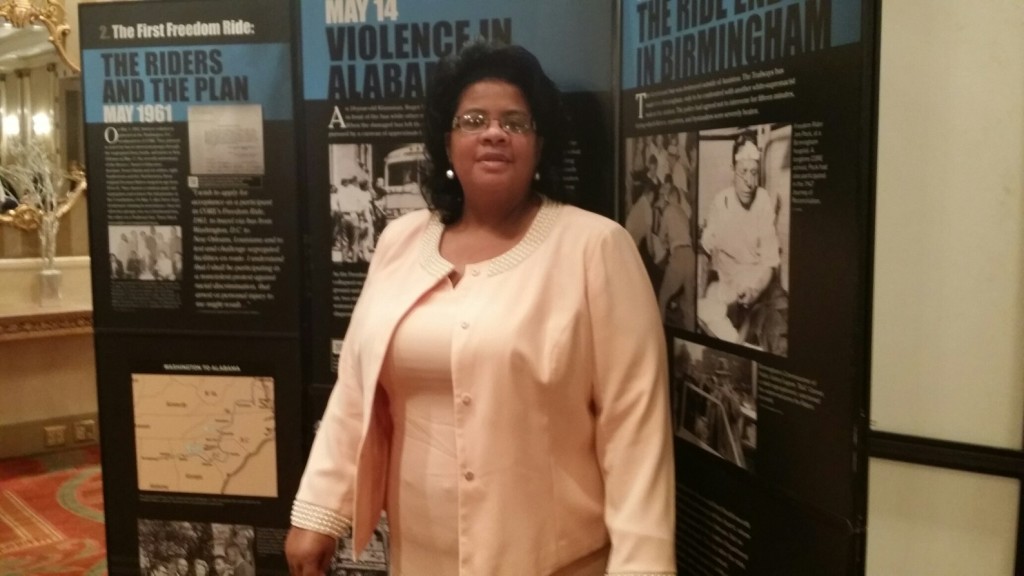Law Center News
Law professor’s scholarship changes course of life for self and others

Prof. Angela A. Allen-Bell never thought that a few law journal articles she wrote between 2012 and 2015 would change the course of her life and the lives of many others.
But that’s exactly what happened after the associate professor of legal writing and analysis at Southern University Law Center (SULC) wrote an article on the constitutional implications of prolonged solitary confinement, then two articles on the Black Panther Party.
Since the release of the articles, Prof. Allen-Bell has become internationally known as an activist, scholar, and an advocate for social and criminal justice, as well as solitary confinement reforms.
She has been interviewed by the Huffington Post, MSNBC, National Public Radio, NBC Nightly News, and other media outlets, including some as far away as France and Canada.
She is also a regular on the speaking circuit at law schools and community and civic organizations locally, as well as across the nation.
“I never, ever envisioned this for my life, but it’s something that feels very natural,” said the 1998 SULC graduate, who began her professional career as a program director at the National Council of Negro Women.
The attorney regularly receives calls from reporters for interviews, families who need help, individuals wanting to collaborate on projects, and requests for speaking engagements.
“I didn’t think it would be any bigger than some articles,” said the New Orleans native and former staff attorney at the First Circuit Court of Appeal. “I just had an interest and wanted to answer some legal questions.”
The article that started it all is titled “Perception, Profiling, and Prolonged Solitary Confinement Viewed Through The Lens of the Angola 3 Case: When Prison Officials Become Judges, Judges Become Visually Challenged, and Justice Becomes Legally Blind.” It was published in the Hastings Constitutional Law Quarterly in Spring 2012.
The Angola 3 case involved three Louisiana inmates who collectively have spent more than 113 years in solitary confinement at Angola, which is also known as the Louisiana State Penitentiary. Albert Woodfox and Herman Wallace were charged in the 1972 murder of a prison guard. Robert King was charged with murdering a fellow inmate. Woodfox has spent more than 43 years in isolation and he remains incarcerated despite two separate rulings setting his conviction aside.
Allen-Bell and other supporters believe the men were wrongly convicted because of their ties to the Black Panthers and they also believe that the extended isolation is unjustified and inhumane. The professor is still working on behalf of Fox’s release.
“After the articles were published, I was contacted by many people because a lot of them had not examined the topic of solitary confinement in the way I had or explored it in Louisiana,” Allen-Bell said.
“The articles involving the Black Panther Party also filled a void because they came along at a time when the American public had begun to entertain the thought of finally coming to terms with our unsettled racial baggage. The articles corrected episodes of racial amnesia and showcased why restorative justice is such an invaluable solution to the racial challenges that plaque the nation.”
In addition to local legislative efforts, she has been invited to speak before the Louisiana Justice Commission and has twice submitted written testimony to the U.S. Senate Judiciary Subcommittee on the Constitution, Civil Rights, and Human Rights. She has also served as an expert reviewer of related materials, which is featured on the PBS website.
Her work is featured in legal research books to be used as a reference for others who are working on similar cases. She also incorporates her passion for social justice into her classroom lessons, giving students invaluable practice-ready lessons. Other law professors from across the country have asked her to share her social justice teaching methods.
She has also been joined by a chorus of other voices who are calling into question current solitary confinement practices, including President Barack Obama, U.S. Supreme Court Justice Anthony Kennedy, Pope John Francis, and United Nations Special Rapporteur on Torture Juan E. Mendez.
“The advocacy part is always the next step,” she said. “Scholarship is irrelevant if it just ends up on the shelf of the library. It only becomes relevant if you take it off the shelf.”
“This is far more than a piece of scholarship,” says the Northwestern State University graduate who was named to the National Black Lawyers Top 100 list. “They are my cries for changes. They are my pleas for those who can’t speak on their own behalf. They are my service to my community, state, and nation. In the words of the late Judge D’Army Bailey, “they are my way of ‘creating a theatre of agitation’ when progress warrants a change of course.”
RSS News Feed